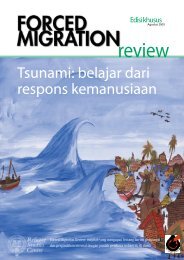FMR 42 full issue pdf - Forced Migration Review
FMR 42 full issue pdf - Forced Migration Review
FMR 42 full issue pdf - Forced Migration Review
Create successful ePaper yourself
Turn your PDF publications into a flip-book with our unique Google optimized e-Paper software.
<strong>FMR</strong> <strong>42</strong><br />
Sexual orientation and gender identity and the protection of forced migrants 31<br />
The judges also declined to address other<br />
potential arguments that are sometimes used<br />
to deny asylum in other parts of the world.<br />
For example, neither ruling addressed the<br />
possibility that the claimant might be able<br />
to avoid persecution by living in a different<br />
part of his home country or by hiding his<br />
sexual orientation, although in the Nigerian<br />
claimant’s case the court did state that “if a<br />
person cannot express his sexuality due to the<br />
fear of being persecuted, it can be regarded<br />
as a sort of persecution”, thus implying that<br />
it would be inappropriate to return someone<br />
to a country where they could remain<br />
secure only by disguising their sexuality.<br />
The importance of these two single cases to<br />
Korean refugee law should not be overstated.<br />
However, these decisions are significant<br />
in that they show that, despite being<br />
relatively new to refugee jurisprudence, the<br />
Korean judiciary is willing to grant asylum<br />
based on sexual orientation persecution<br />
to applicants coming from countries that<br />
are considered to be hostile to gays.<br />
Andrew Wolman amw247@yahoo.com is<br />
Associate Professor, Graduate School of<br />
International and Area Studies, at the Hankuk<br />
University of Foreign Studies, Seoul, Korea.<br />
1. With the exception of men in the military.<br />
Challenges to producing LGB-specific Country of Origin Information<br />
Christian Pangilinan<br />
Evaluations of whether lesbian, gay and bisexual<br />
(LGB) asylum claimants have a well-founded fear<br />
of persecution frequently require Country of Origin<br />
Information (COI) on the state of LGB people<br />
in the country of origin. However, information<br />
on LGB populations in countries where being<br />
LGB is criminalised is often difficult to obtain<br />
and frequently anecdotal. First-hand accounts<br />
from LGB people themselves are rare.<br />
In order to help address this lack of information<br />
in Tanzania, I interviewed 40 self-identified LGB<br />
people in Dar es Salaam. Some organisations and<br />
individuals – primarily those who advocate for<br />
shielding LGB advocacy within advocacy for HIV/<br />
AIDS prevention and treatment – advised me that<br />
people would refuse to answer direct questions<br />
regarding their sexual orientation. However, I did<br />
not find that direct questions alienated respondents<br />
(even those who did not self-identify as LGB).<br />
Those whom I interviewed had experienced<br />
discrimination by family members, removal from<br />
school, derogatory and hate language, harassment<br />
by police, humiliating treatment by medical<br />
providers, fear of accessing public transportation<br />
and, in one case, corrective rape. Obtaining this<br />
information presented some unexpected as well<br />
as expected challenges, which others seeking<br />
COI information might do well to bear in mind.<br />
Access to LGB organisations can be restricted,<br />
especially since many such organisations<br />
tend to operate underground in order to evade<br />
government scrutiny or to ensure activists’<br />
personal safety. Careful referrals may be needed<br />
in order to collaborate with such organisations.<br />
Information gathered will inevitably depend on which<br />
stakeholders are contacted. In addition, it should<br />
not be assumed that all LGB activists are on the<br />
‘same side’. LGB organisations may be in active<br />
competition or even in conflict. While differences<br />
of strategy may be expected, LGB organisations<br />
in Dar es Salaam also compete for legitimacy as<br />
representatives of LGB people, driven in part by<br />
competition over access to funds. Any inquiry into<br />
LGB people should take care to obtain insight into the<br />
organisation’s credibility with LGB people themselves.<br />
Christian Pangilinan is a refugee legal aid lawyer in<br />
Tanzania christiandpangilinan@gmail.com




